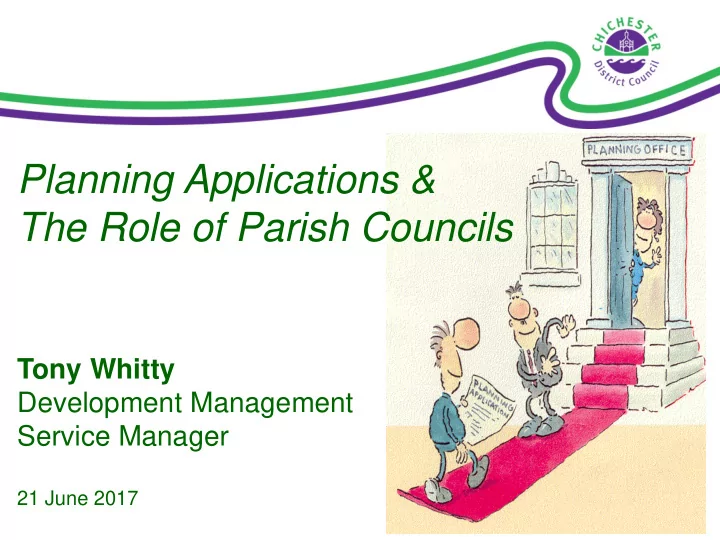

Planning Applications & The Role of Parish Councils Tony Whitty Development Management Service Manager 21 June 2017
Programme - Overview of Development Management Service at CDC - How decisions are made - Policy Context - Material considerations - The decision - Appeals
The DM Service Teams Development Management Service Manager Tony Whitty Major Applications and (Minor) Applications South Downs National Business Team Team Park Team Development Manager Development Manager Joanna Bell John Saunders Principal Planning Principal Planning Principal Planning Officer Officer Officer Derek Price Jeremy Bushell Fjola Stevens
Delegated decisions • Account for 95% of all decisions on planning applications • Officer makes recommendation to Manager/Principal Officer • Any Member may request an application is determined by the Planning Committee (‘Red Card’) - Ideally prior to the consultation expiry of the application - But can be anytime up to the point that the decision is agreed • Examples of justification for Red Card - Major development (Not generally for minor development) - Exceptional level of public interest - Information to raise in debate on planning issues.
Other reasons for a Committee Decision • Parish objection where the officers are recommending permission - does not include; - DOM/HOUS – domestic extensions - PLD/ELD/LDC – lawful development certificates - TPO/TPA/TCA – works to protected trees • Member or employee of the Council, or spouse or partner • Where the decision would be significantly contrary to policy in the Local Plan • Where the Council is the applicant
The Planning Committee • 15 Members • Held every 4 weeks • An element of public speaking - 3 individuals in objection - 3 individuals in support - Parish Council - Ward Councillor - WSCC Member • Site visits may be agreed where characteristics of site cannot be adequately conveyed through the officer presentation
Role of Parishes • Role of Parishes as statutory consultees • Represent local views • Provide local knowledge • Raise areas of concern • Inform debate and add value to the process • Neighbourhood planning – link between community and the Council, involved in local decisions on spending • Comments should ideally be relevant and appropriate – clear recommendation.
Basic principle: start with the plan Basic principle: start with the plan “……have regard to the provisions of the development plan, so far as material to the application, and to any other material considerations”. Town and Country Planning Act 1990, section 70
What is a material consideration? • In principle any consideration which relates to the use and development of land is capable of being a material consideration However, they must be; • Genuine planning considerations • Matters of relevance to the development
Material Considerations? Development Plan policies Government advice Past Planning History/ appeal decisions
Material Considerations?
Material Considerations? Work that has been done without planning permission …
Material Considerations? Traffic generation & overall highway safety Adequacy of parking
Material Considerations? Overshadowing and loss of light
Material Considerations? Design, appearance & materials Loss of property value
Material Considerations? Noise & disturbance: From construction work From the use
Material Considerations? The effect on the street or area (but not loss of private view) Building Regulations ...and other matters controlled under other legislation
Material Considerations? Competition Ground contamination
Material Considerations? Identity or personal characteristics of an applicant Personal circumstances of an applicant Personal need for development
Material Considerations? Issues of Morality Overlooking and loss of privacy
Material Considerations? Financial Considerations When are financial consideration material? – Section 143 of the Localism Act deals with local finance considerations – Defined financial ‘benefits’ (significant New Homes Bonus and CIL) can be taken into in the determination of planning applications ‘where material to the application ’. – Issues of viability (open book)
Not Material Considerations land & boundary disputes land ownership damage to property private rights of way deeds & covenants
Not Material Considerations private Issues between neighbours
Not Material Considerations One objector Lots of objectors NOT a reason for refusal… Still NOT a reason for refusal…
Conditions Planning conditions should only be imposed where they are: • necessary • relevant to planning and to the development to be permitted • enforceable • precise and • reasonable in all other respects Pre-commencement conditions must be justified
Reasons for refusal • Must be: Robust Directly related to the development proposal Have regard to the development plan Relate to material considerations • Can you describe the harm that would result (in planning terms) if the development went ahead? And why conditions would not be sufficient to mitigate that harm?
Reasons for refusal There are three stages in identifying a reason for refusal • Identify the specific problem (it must be a relevant material planning consideration); • Identify the harm that it would cause to the public interest ; • Set the objection in a policy context
Appeals • against a refusal • against a condition on permission • against an enforcement notice • against failure to determine within the statutory period
Appeals 3 types of appeal • written representations • hearings • public inquiries Judicial Review and Ombudsman
Award of costs Costs for unreasonable behaviour (even when not sought) – decisions based on evidence? • the other party must have behaved unreasonably, causing unnecessary expense or delay • one of the parties could seek an award or an Inspector has the discretion to award. • it can be for full or partial costs
Examples of circumstances which may lead to an award of costs • Ignoring relevant national policy • Failure to produce credible evidence to substantiate the reason for refusal • Persisting in objections to a scheme: o that already has permission o where previous concerns have been overcome • Refusing details as a way of re-visiting the principle
Appeal Decisions • Must be given appropriate weight • Content of whole decision letter must be considered • Appeal decision is binding and there is no right of appeal unless on a point of law.
Recommend
More recommend